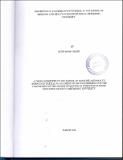| dc.description.abstract | Effective teaching is an integral aspect of quality in the teaching/learning process that should be judged based on the performance of the graduates of an academic program and achievement of curriculum outcomes. However, teaching is a complex and demanding activity that involves mastery of content, classroom control, techniques of organization, and command of teaching skills. Teaching consists not only of instruction, but also of the systematic promotion of learning using various strategies. Thus an interest in evaluating perception of teaching effectiveness has increased over time and this is also a pertinent issue for KeMU School of Medicine and Health Sciences, to meet the standards of the health profession by effectively offering quality medical education. The purpose of this study was to determine the effectiveness of teaching in the undergraduate degree programs in the School of Medicine and Health Sciences at the Kenya Methodist University (KeMU) main campus. Despite a wide use of various evaluation tools, little is known about perception on evaluation of teaching effectiveness and especially in KeMU. Such knowledge is important to facilitate interpretation of evaluation results and process. The School of Medicine and Health Sciences offers undergraduate programs byfull • time face to face instruction, part time and Open and Distance Learning Mode (ODLM).This study focused on the full time face to face mode of instruction. A descriptive cross-sectional design and questionnaire were used. The sample was a total of 18 lecturers and 80 full time students in the School of Medicine and Health Sciences representing 4 different programs. An interview guide was designed to elicit views from the Chairmen of 4 Departments (CoD) in the School of Medicine and Health Sciences with full time students and Director of Quality Assurance and standards (DQA) regarding the teaching and learning process in the School. The findings showed that 89% of the lecturers stated that they demonstrated mastery of content compared to 49% of the students.The findings also indicated that evaluation was viewed as a means to facilitate improvement within medical education. On the other hand 72% of the lectures appreciated that evaluation of their teaching effectiveness improved their performance and teaching skills. Thus teaching quality education was believed to be dependent on content, process, teacher and student characteristics as well as learning outcome, with an emphasis on the latter. Hence the findings shows that adherence to laid down policies, lecturers competences in content delivery and knowledge of the subject in relation to making use of the evaluation tool will improve the performance of both the lecturers and the student. Medical students and medical lecturers stressed that continuous evaluation and staff development should be the primary goal for the School in the evaluation process. The ultimate goal is to improve the teaching in the School of Medicine and Health Sciences. | en_US |

